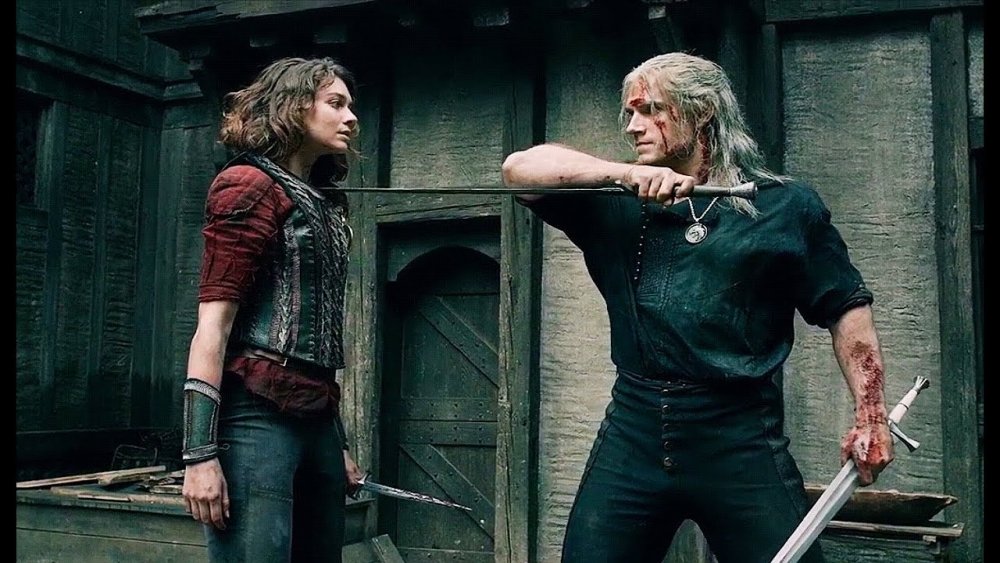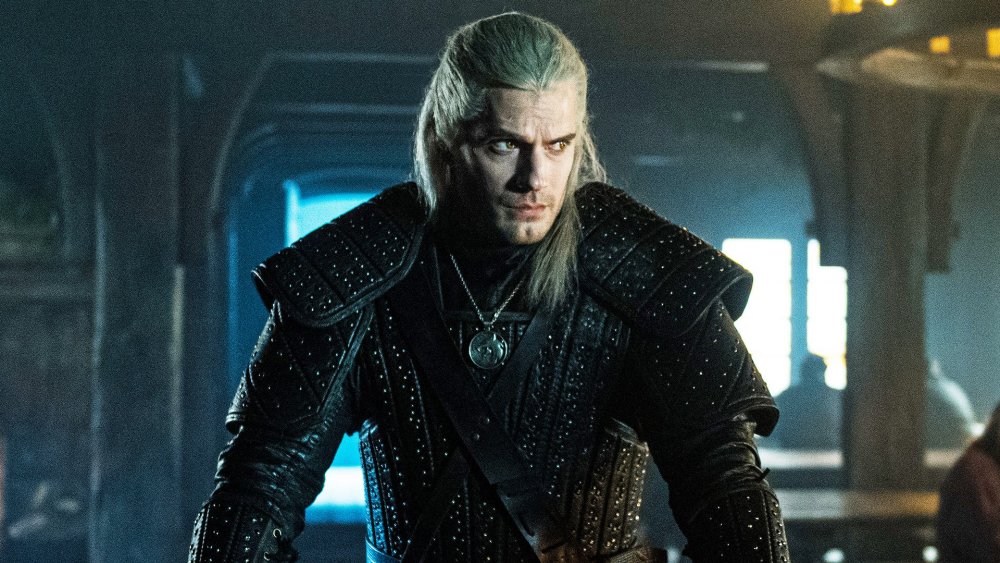This One Shot Speaks Volumes About Geralt And Renfri's Relationship
With all new TV series comes a long press tour, and Netflix's The Witcher was no exception. For the fantasy adaptation, however, Netflix did something a little different: the company had lead actor Henry Cavill sit down for a video to discuss the intricacies of shot construction for several parts of the first episode's climactic fight scene in Blaviken. The video is certainly worth a watch for Cavill giving an ASMR-quality rundown on stunt coordination and flexing his knowledge of the novels that the series is based on, but we're most concerned with what the actor had to say about Geralt and Renfri's final, nearly-wordless confrontation.
In the video, Cavill explains Geralt's emotional motivations as he corners Renfri (Emma Appleton), then offers her one final opportunity to give up her aggression and walk away. He holds a sword directly at the base of Renfri's throat, and instead of shoving it straight through or swiping it across, Geralt lets the weapon hover. This is a show of respect for Renfri's personal struggle — but, of course, Renfri doesn't accept his grace, and Geralt is forced to kill her.
This one shot says a lot about Geralt's relationship with Renfri: they're both misunderstood individuals with difficult pasts, and Geralt recognizes that Renfri has the capacity to be more than what others think of her. As Cavill states in the video, "He allows her one last chance — walk away from Blaviken, forget, and you won't be a monster."
Through this scene and particularly the shot of Geralt holding a sword at Renfri's throat, astute viewers can understand the most important combined and individual emotional essentials of Renfri and, more importantly, Geralt. This the smallest, most digestible unit for understanding how The Witcher succeeds at accomplishing as much storytelling — balanced between economical and emotional punch — as possible.
The Witcher is a complex, swirling dance of a non-linear narrative, and it doesn't necessarily prioritize explaining itself to the audience. It performs a two-step and expects you to have enough wit to at least keep beat, if not perfect footwork along with it. It's a high-risk, high-reward strategy for a showrunner, and Lauren Hissrich has so far executed it well. That's only just the beginning, however. Let's pull back our perspective and look at just how much one tiny piece of the puzzle can say in well-written circumstances.
The moment between Geralt and Renfri demonstrates excellence in visual storytelling
Cavill's analysis of the exchange between Renfri and Geralt isn't just about the immediate moment. A lot of Geralt's overall emotional perspective is revealed in this single shot that's meant to carry over the entire series. Geralt, a genetically mutated monster-hunter known as a witcher, is initially presented as rough, tight-lipped, and bitter. Later, with Renfri, we see a man capable of deep respect of life and honor, feeling lost in his circumstances. He doesn't want to be feared, but understands that's what keeps him alive more than any of his other impressive skills.
Hissrich chose to adapt Andrzej Sapkowski's short story in which Renfri is introduced — The Lesser Evil — for this specific reason. Her original pitch to Netflix says that "it sets up Geralt's entire moral dilemma for the entire series in a clear and understandable way." It's a one-two punch: first, the exposition in the forest where Geralt and Renfri come to relate to each other as feeling like monsters, separate from the world and bound by fate; then, then the pay-off at the end of the episode, when Geralt offers to let Renfri leave with no questions asked, and yet she chooses to succumb to fate and die.
As the cherry on top, Renfri's last words are to remind Geralt of the fate he has desperately tried to avoid in Ciri (Freya Allan). The rest of the villagers arrive, make an incorrect assumption of Geralt's intentions in killing nearly a dozen people, and he's ostracized anew, completing the cycle. The relationship created on the episode crystallizes into the overall character thesis instantly, and with no direct exclamation of exposition. It's a masterwork in show and tell — Geralt is the lesser evil, and he must find positive purpose and identity from that.

